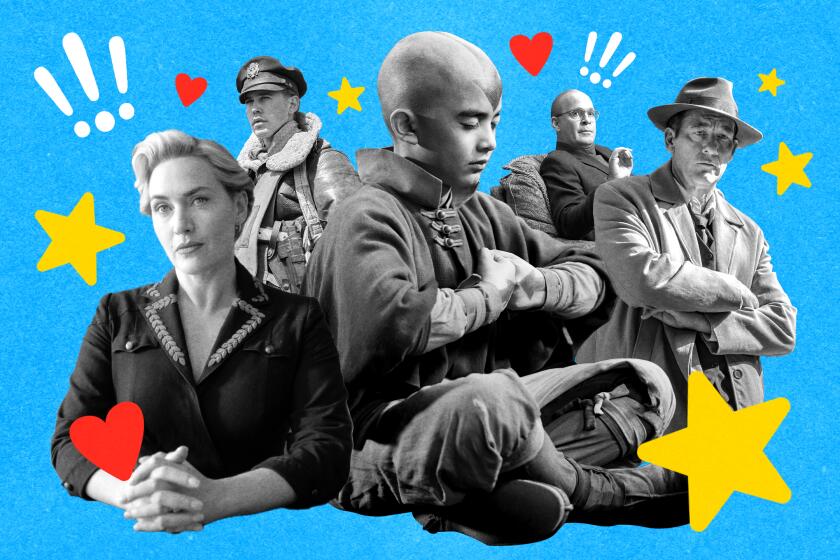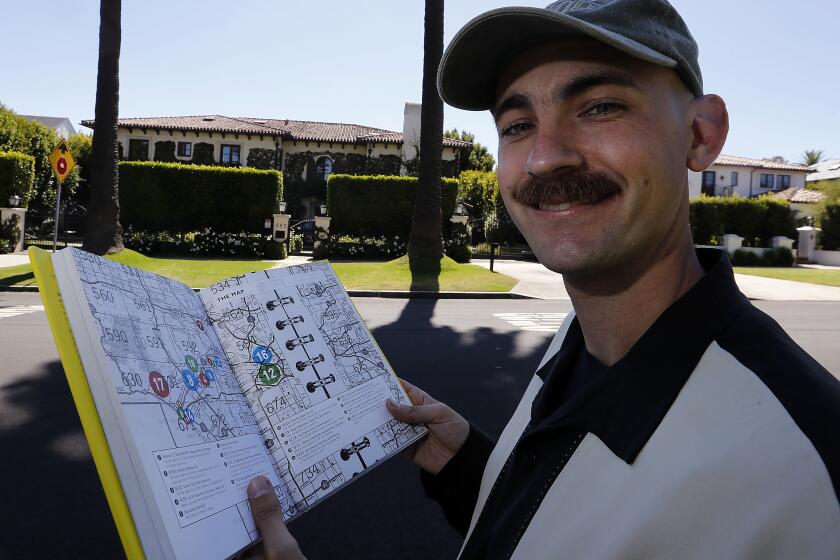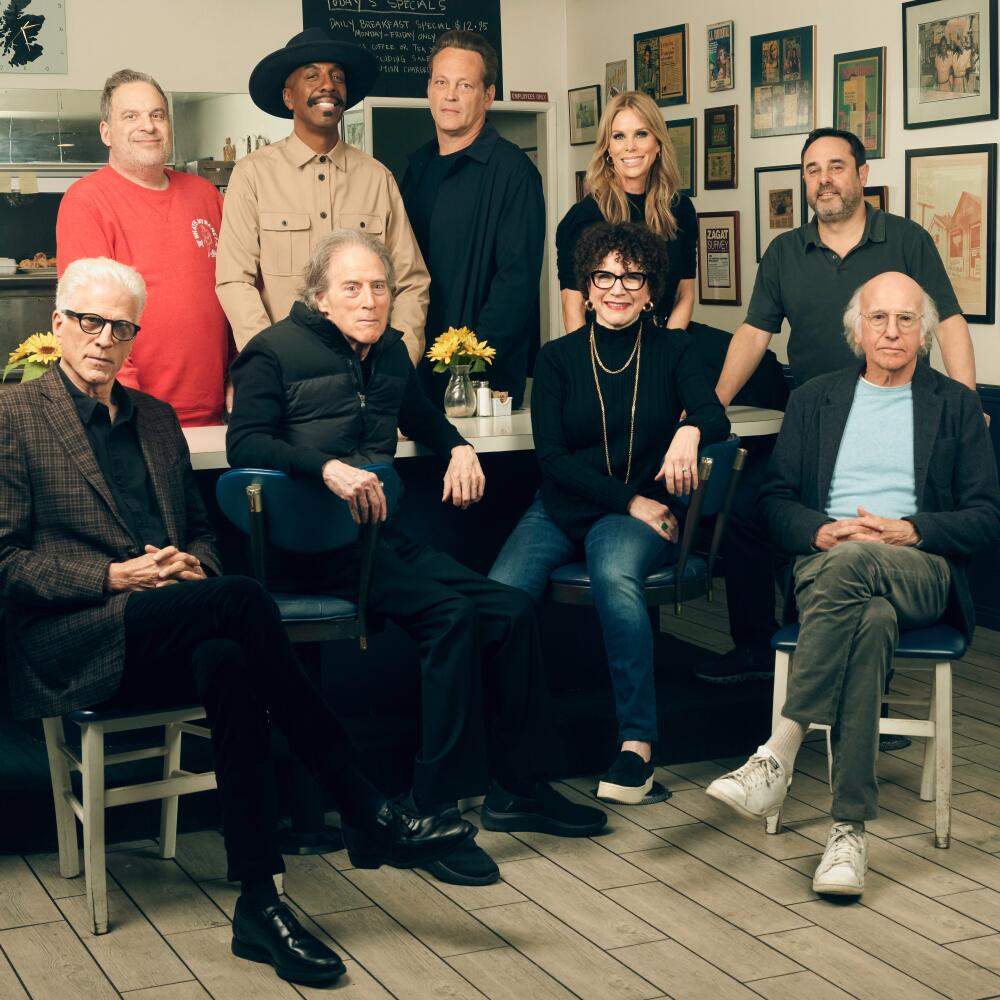
- Share via
Interviewing Larry David at his Santa Monica production offices comes with photographic documentation of the entrance and a note to pull in and park as straight as possible in order to be courteous to the building’s other residents.
But when I arrived on a recent Wednesday morning, someone had taken up two spots.
“Oh, that’s Larry,” laughs Laura Streicher, co-executive producer of creator and star David’s famously cringe-inducing chronicle of social transgression, “Curb Your Enthusiasm.” “He’s a pig parker.”
The phrase is one of many that have entered the vernacular from the HBO comedy series, which first premiered in 2000, restarted after a six-year gap in 2017 and will (supposedly) conclude with its forthcoming 12th season, premiering Feb. 4. Originating in Season 8, “pig parker” means someone who is self-absorbed and greedy enough not to take the time to park between the lines, an act that will inevitably lead to utter bedlam and the destruction of a democratic state.
We gathered together the TV experts at The Times to preview our most anticipated new and returning TV shows of 2024. Here are 14 to keep an eye out for.
Although “Curb” is largely improvised, there is an outline for each episode and a story arc for the season. Some of the terms made famous by the show stemmed from conversations, ideas or situations that happened decades ago, even before David and Jerry Seinfeld’s legendary NBC sitcom, “Seinfeld.’’ Others, like the titular euphemism of Season 9’s “A Disturbance in the Kitchen,” derive from more recent events — in this case, what a real-life waiter told David to explain why his meal was delayed. (In the episode, David’s character decides to investigate the situation and gets into a fight with the chef.)
Whatever their provenance, all usually allow David’s alter ego to serve as a cathartic Everyman for both the real David and those watching at home: He is a pretense-free embodiment of everything that members of polite society wish they could say but don’t. Then again, for most of us, fighting in a restaurant, blowing up a business deal over a broken toilet seat, talking during a prayer service or going to all-out war with a coffee shop owner or another patient in the doctor’s waiting room would mean shame, social ostracism, possibly jail. On “Curb,” it’s simply par for the course.
The language of the series has even bled into David’s personal life, as it‘s become increasingly difficult to separate the man behind “Curb” from his character on it. (David has not necessarily discouraged this conflation; he once told a journalist during a panel at the Television Critics Assn. press tour that “TV Larry is just a quarter of an inch away from real Larry. Real Larry plays TV Larry.”)

“I used to fight with people. I’d ask someone the time and they’d go ‘I dunno.’ And I’d go ‘It’s just the time!’ I can’t do that anymore.”
— Larry David
“As the show got more popular, it’s given me a little more liberty to behave in the way that the character behaves, which is the way I’d like to behave,” David says. “At a dinner party now, I’ll always be the first to leave. And people just expect it.”
There is a downside, though.
“I can’t fight with people anymore,” David laments. “I used to fight with people. I’d ask someone the time and they’d go ‘I dunno.’ And I’d go ‘It’s just the time!’ I can’t do that anymore. I can’t have any confrontations because I’ll be filmed. And I’ll be on the internet. So I have to be on my best behavior when I’m out amongst them.”
Larry David aficionado Adam Papagan takes The Times on his “Curb Your Enthusiasm” tour, which doubles as a love letter to low-key Westside establishments.
Nowadays, David usually takes notes on his phone because it’s more inconspicuous than a notepad — and because he says he was “bereft” when he lost a pocket journal of ideas 20 years ago (imagine if that wound up on EBay). Ideas then go into what series executive producer and showrunner Jeff Schaffer dubs the “Google search”: A desk drawer in David’s office that’s filled with spiral notebooks brimming with hand-written transcriptions of these observations.
It’s unlikely any of these musings or encounters will stop when “Curb” ends, which David insists is happening even if fans are dubious of a creator who already ended the series’ fifth season (in 2005) with an episode titled “The End” and almost ended last season with his character dying.
“I don’t feel like [Larry’s] done having spirited conversations with the populace of the Westside of Los Angeles,” says Schaffer.
Before the sun sets on “Curb Your Enthusiasm” one last time, David, Schaffer and some of the series’ most prominent cast members shared the backstories behind a handful of “Curb’s” greatest moments.

Pretty, pretty, pretty good
Of all the catchphrases associated with “Curb,” David’s drawn-out refrain that things are “pretty, pretty, pretty good” when they most definitely not has become the show’s de facto tagline. It’s first used in the series’ third episode as a form of shorthand, relating information to one character that’s the opposite of what the audience already knows: Here, Larry ponders how, or if, to tell his then-wife Cheryl (Cheryl Hines) that his quest to get driving directions didn’t go swimmingly. It’s also been used on the show as a stall tactic or avoidance strategy during other encounters and conversations Larry does not want to have.
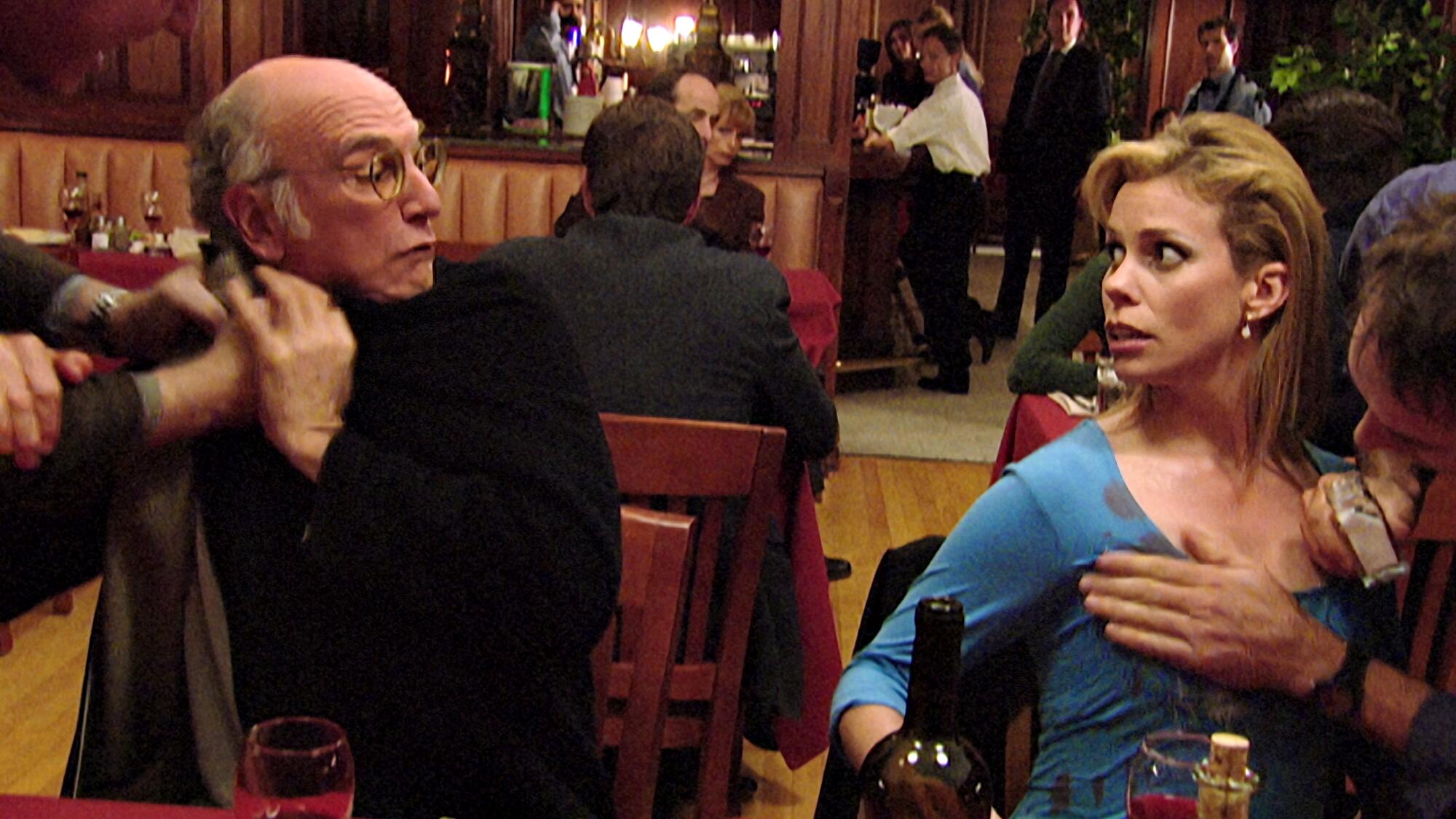
The bit began in David’s days as a stand-up in the 1980s, when he’d joke that you could never really tell your parents how you feel: “You can be on the verge of suicide with your head in the oven and [they’d say] ‘How are you feeling?’ ‘I’m good. I’m doing good.’”
But the phrase would be nothing without its setup.
Hines trained at improv theater the Groundlings. She says that “one of the ideas behind their teaching of improv is to not ask questions in an improv. But in ‘Curb,’ I have to.” For the first three seasons of the show, she never even got an outline of the script.
“I never know what they’re shooting in other scenes,” she explains. “A lot of the time, I don’t even know what’s been shot or what’s been said. By the time he tells me what’s going on, it’s bad. So my only reaction is, ‘What are you saying? Why did you do that? Why would you do that?’”

Beloved Aunt
When Cheryl and her family mourn a relative in Season 1, Larry offers to help by writing the obituary — but submits it with an unfortunate typo that turns the word “aunt” into a similarly spelled vulgarity most often directed at women.
David says this story line came from an actual typo a New York Times reporter told him about that, luckily, did not make it into print.
It’s also one of the few times the show has made Larry’s infraction accidental.
David jokes that “my character is malleable.”
Sometimes, Schaffer explains, we’ll get “sharp-as-a-tack Larry, who’s calling somebody on something. Or, if the scene calls for it, slightly oblivious Larry who’s gonna keep pounding and not knowing he’s stepping in it further.”
Robert B. Weide, who was “Curb’s” principal director and an executive producer on its first five seasons and still directs episodes of the show, admits that he will “occasionally give somebody a line if I thought it was funnier.” While directing this episode, he gave Paul Dooley, who played Cheryl’s father, the line “I’m just glad you weren’t in charge of the headstone.”

Larry trips Shaq
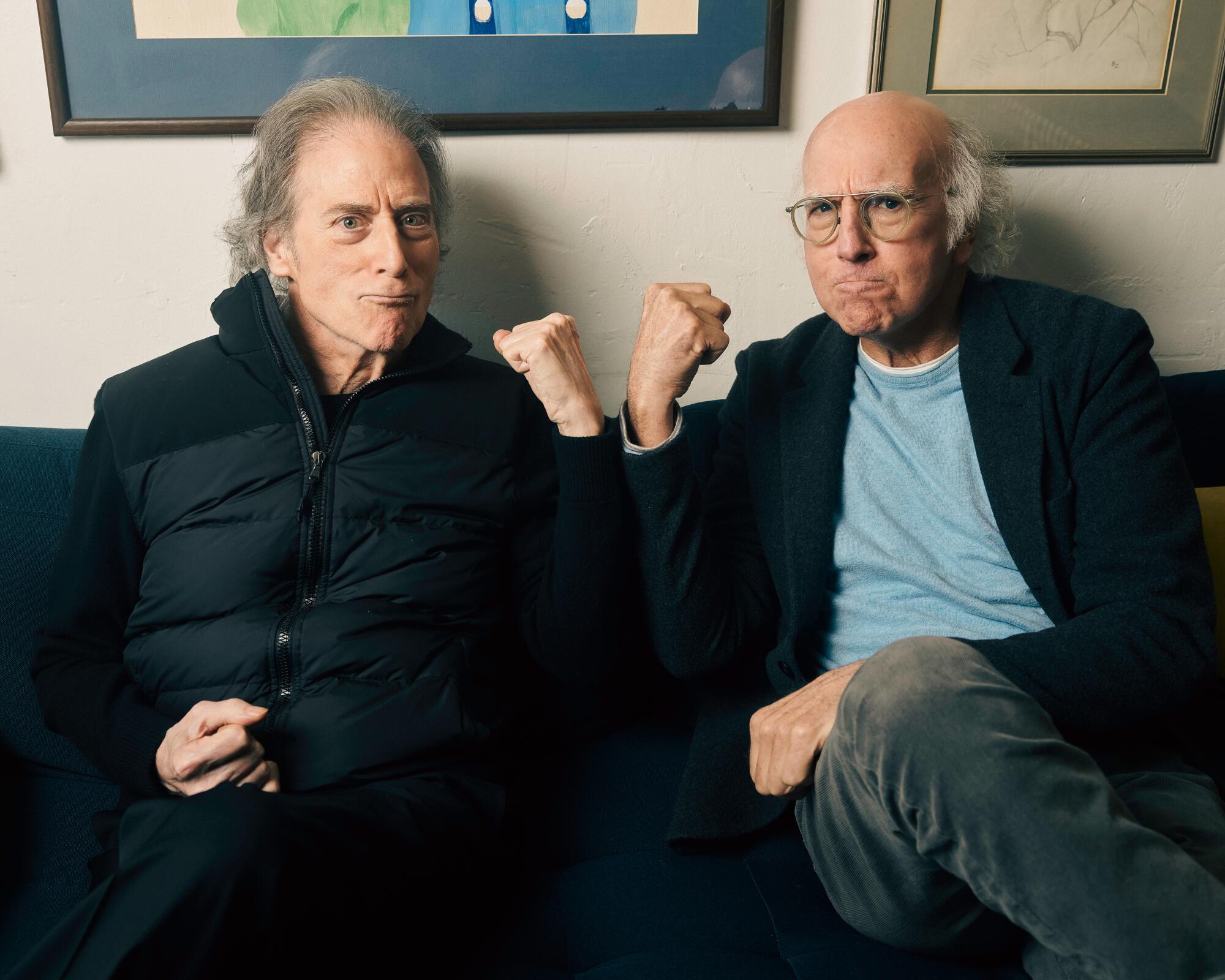
“Curb’s” knack for showing how easily an innocent interaction can devolve into mob rule is epitomized by the Season 2 episode “Shaq.” There, Larry and his best friend Richard Lewis (played by David’s actual childhood friend, comedian Richard Lewis) have floor seats at a Los Angeles Lakers game. Things are going fine until Larry stretches out his long legs and accidentally trips, and injures, star player Shaquille O’Neal. He’s subsequently booed out of the stadium.
“The only impetus was that I have sat on the floor and I have stuck my legs out and I thought, ‘Oh, this would be funny if one of them tripped on my legs,’” David says plainly of the episode’s conception.
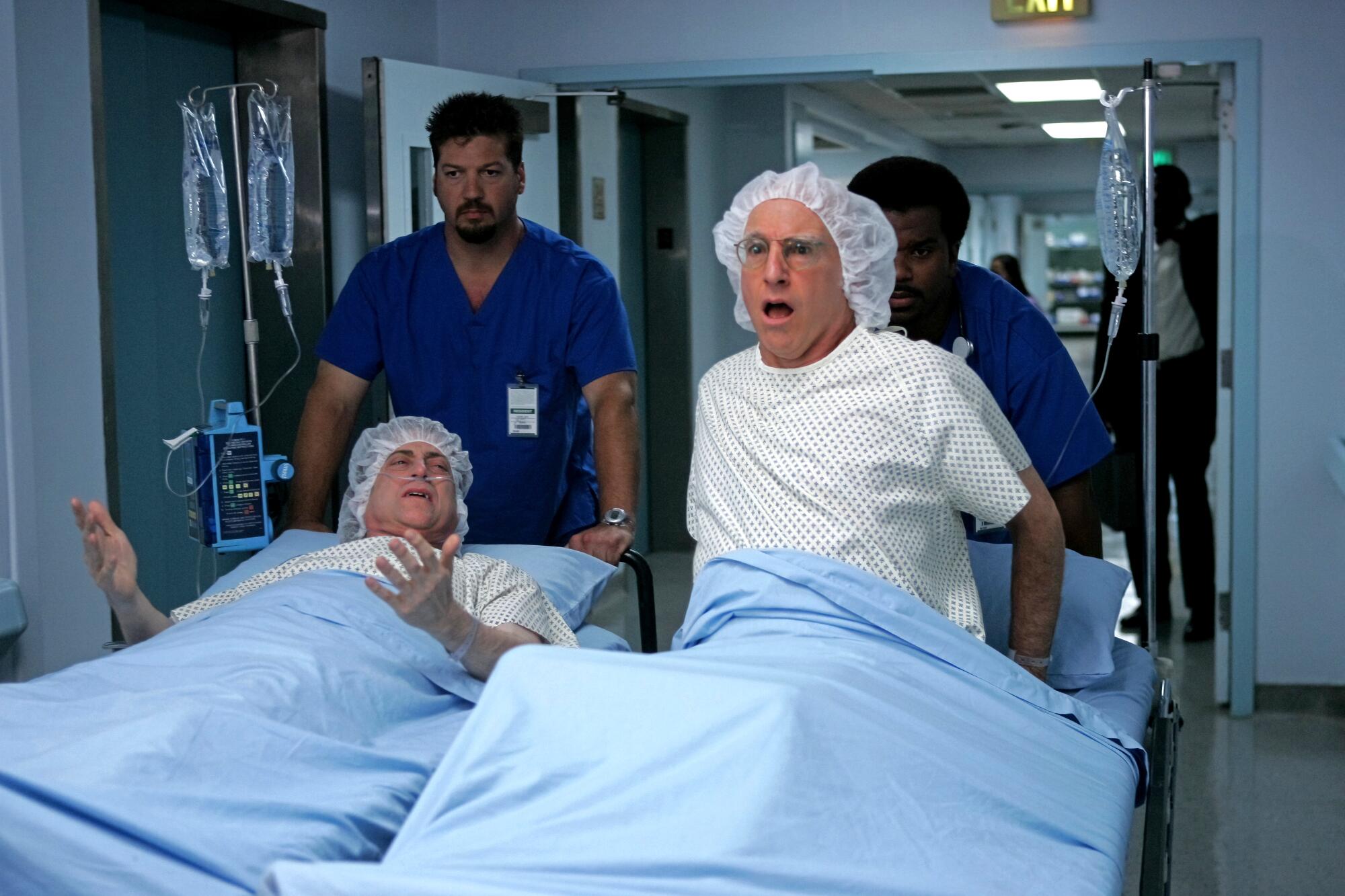
Stunt performer Eric Mansker officially took the fall for O’Neal and director Dean Parisot filmed that moment with just background performers. (Weide says it’s Mansker we see in the overhead shot but that O’Neal took a less severe fall onto mattresses so as to better sell it.) Other aspects of the episode were shot at what was then called the Staples Center with a crowd watching.
“I knew he was going to be tripped but I didn’t expect the crowd to start booing,” Lewis recalls. “Some of the people that were sitting very far away, they might not have seen the cameras, but they would have recognized us.”
It’s “an example of not knowing what’s real,” he adds. “Am I just being me or am I acting?”
In this case, he says both the real and the fictitious Richard Lewis wanted to get outta Dodge: He remembers walking up the flight of stairs to get out of the arena with his jacket over his face.

Susie’s standoff
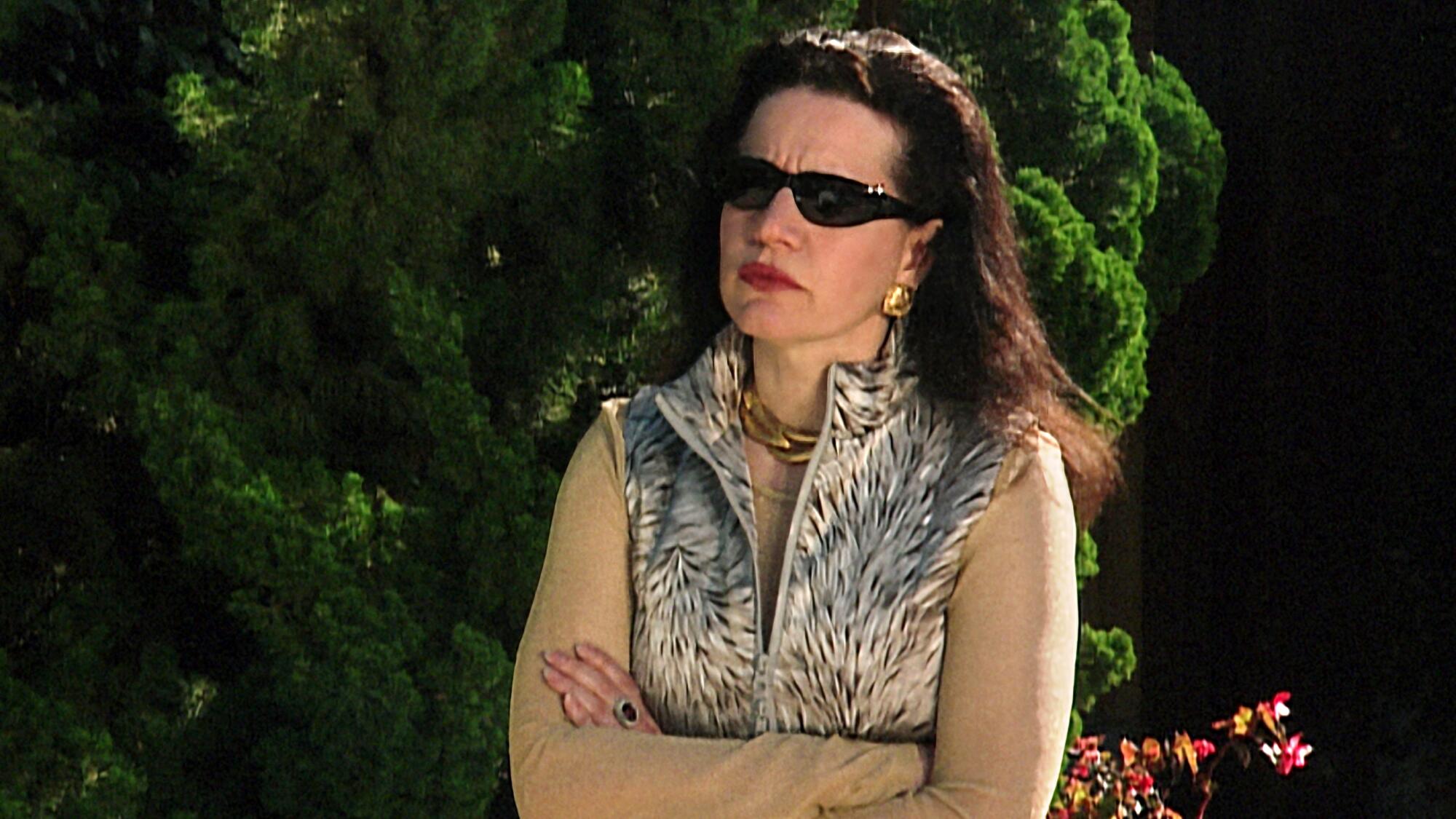
Susie Essman started on “Curb” as a supporting player, appearing in the first season as the wife of Larry’s manager (and frequent partner in shenanigans) Jeff Greene (Jeff Garlin). But she really came into her own as Larry’s foul-mouthed and flamboyantly dressed nemesis in the Season 2 episode, “The Doll.”
Inspired by David’s own desire to give one of his daughter’s dolls a haircut, the episode features Larry and Jeff stealing a doll from Jeff and Susie’s daughter to make amends for another child’s toy receiving a new ’do. It fails miserably and, aided by a perfectly cued score from music editor Steve Rasch, a western-style standoff ensues.
“That’s when that was established, that Jeff and Larry would live in fear of Susie,” Essman recalls.
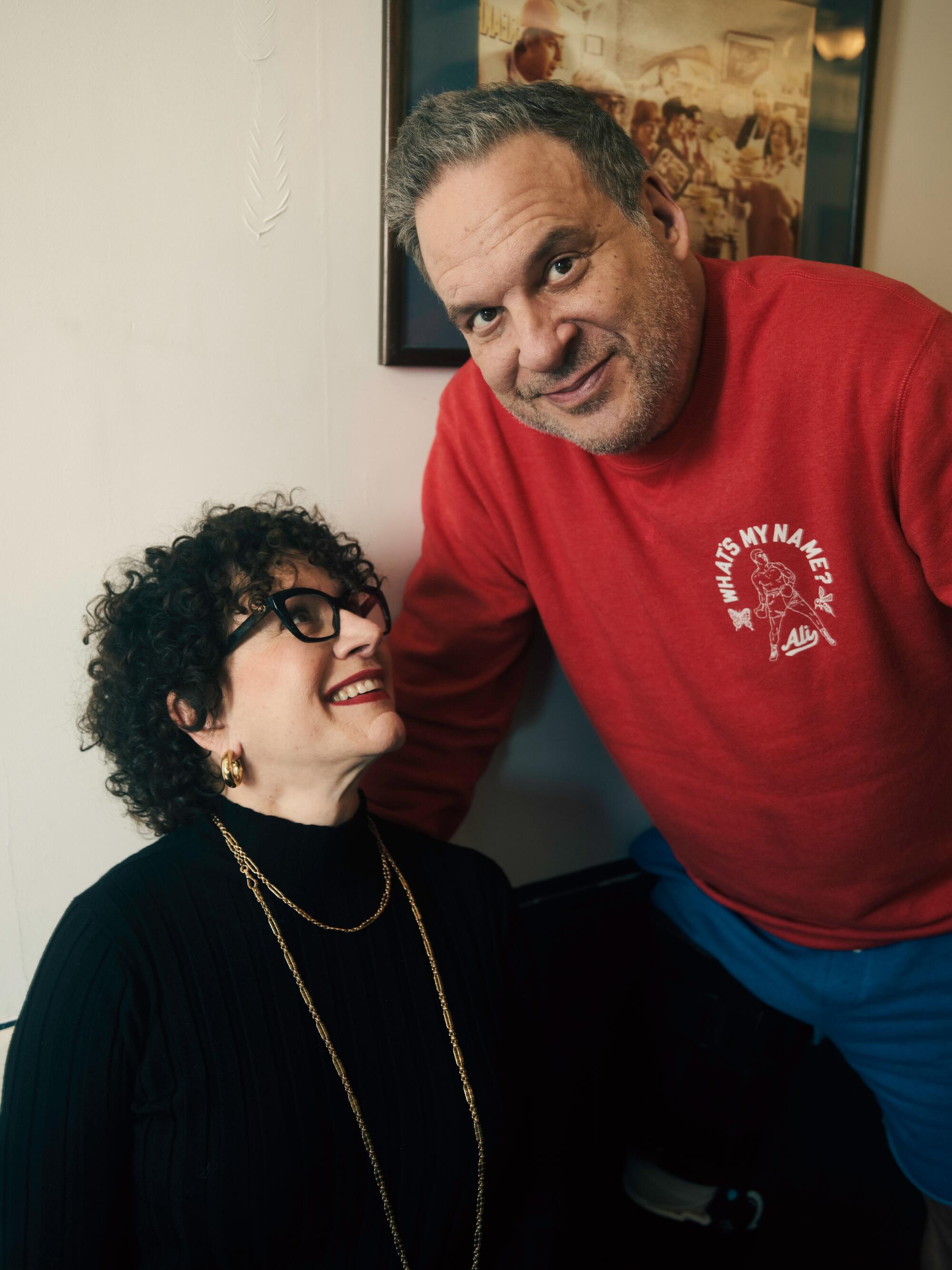
“I never try to top Susie Essman. I just have to live and breathe.”
— Jeff Garlin
That Susie stays married to Jeff despite a separation and his continued philandering is perfect, says showrunner Schaffer, because her presence feels organic to the story. (Later in the series, Susie tells Jeff that, if they were to split up, there’s no way she’d give him a “nice divorce.”)
“If they’re gonna be engaged in skullduggery, you need someone that they’ve got to skulk around,” Schaffer says. “And that person can’t be living now in a townhouse in Venice.”
Garlin, whose comedy background includes time at Chicago’s the Second City improv house, says, “I’ve worked with comedic actors before, who liked doing ‘a top.’”
“A top is where the scene’s over, you’ve said your line, and they want to talk when you’re done,” Garlin explains. “I never try to top Susie Essman. I just have to live and breathe.”
Essman loses her voice on days where she has to scream in a scene.
“That said, I go home that night and I sleep really, really well because I’m so relaxed,” she admits.

‘Get in that a—’
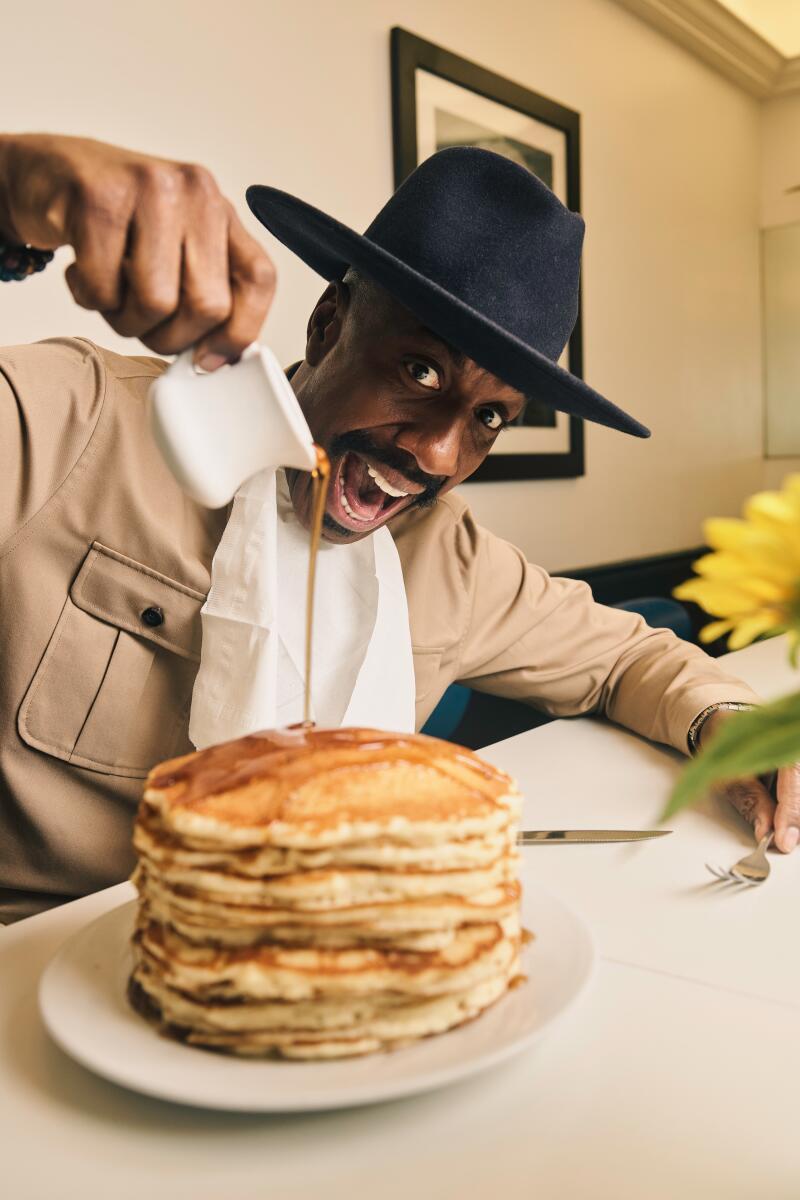
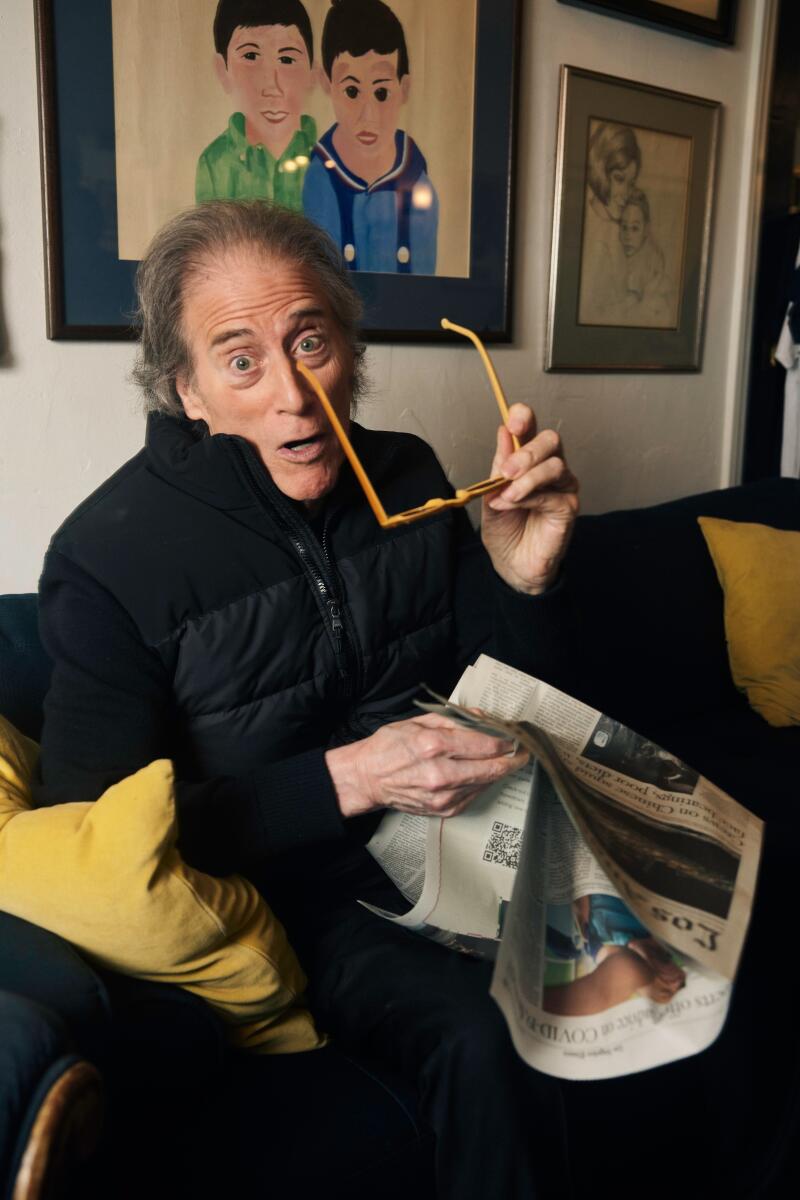
One of the few people who can impart life lessons onto Larry is J.B. Smoove’s Leon Black. Appearing in “Curb’s” sixth season when Larry and Cheryl take in his sister Loretta (Vivica A. Fox) and her family after Hurricane Edna and then never leaving, Leon will go along with a lot of Larry’s schemes because he also doesn’t suffer fools.
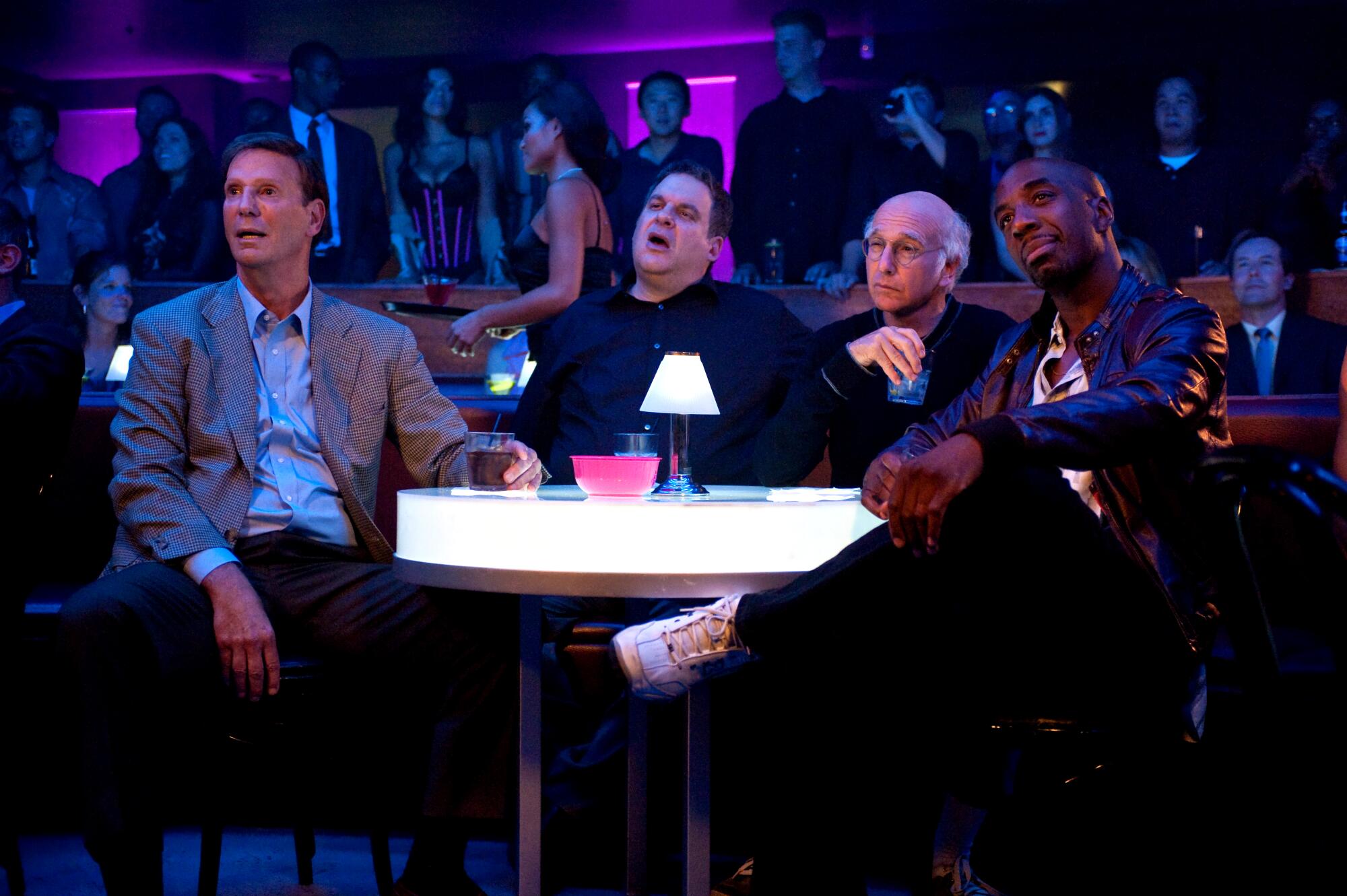
In the sixth season’s fourth episode, “The Lefty Call,” Leon advises Larry that the only way to stand up to a bully is to “get in that a—.” (In other words, stand up for yourself.) And as with much of the magic of “Curb’s” improvisational style, the scene reflects David and his character’s teachable moment simultaneously.
“That was the first thing we ever did together and Larry had never heard the term before,” Smoove says. “He was so perplexed as to what ‘get in that a—’ meant … So it really became a lesson [for him] while we were doing the scene. There have got to be five versions of that scene, easily … One involved lighter fluid and a cigarette lighter … I called it an ‘a— arsonist.’”

Anonymous Donor
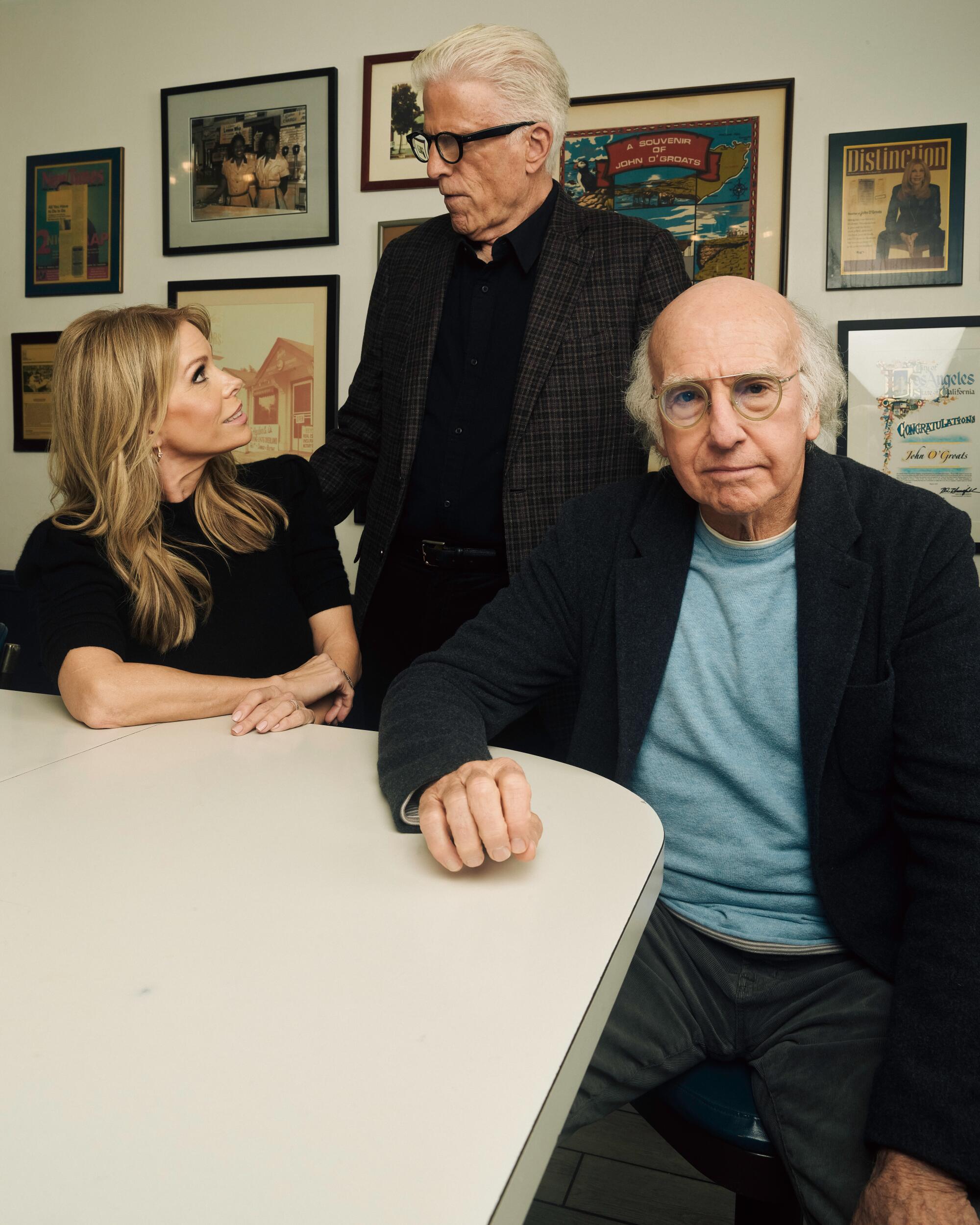
What’s more obnoxious than someone who wants a plaque for being a good Samaritan? The people who say they don’t want the recognition but also tell everyone that they’re the so-called “anonymous” donor. Not surprisingly, David knows someone who did this. Also not surprisingly, this ate at him enough that he put it into the show. So David’s friend and frequent “Curb” guest star Ted Danson returned to play a heightened version of himself as the titular “Anonymous Donor” during the show’s sixth season.
Schaffer sees the episode less as David passive-aggressively acting out a grudge fantasy than him being “a defender for social justice.”
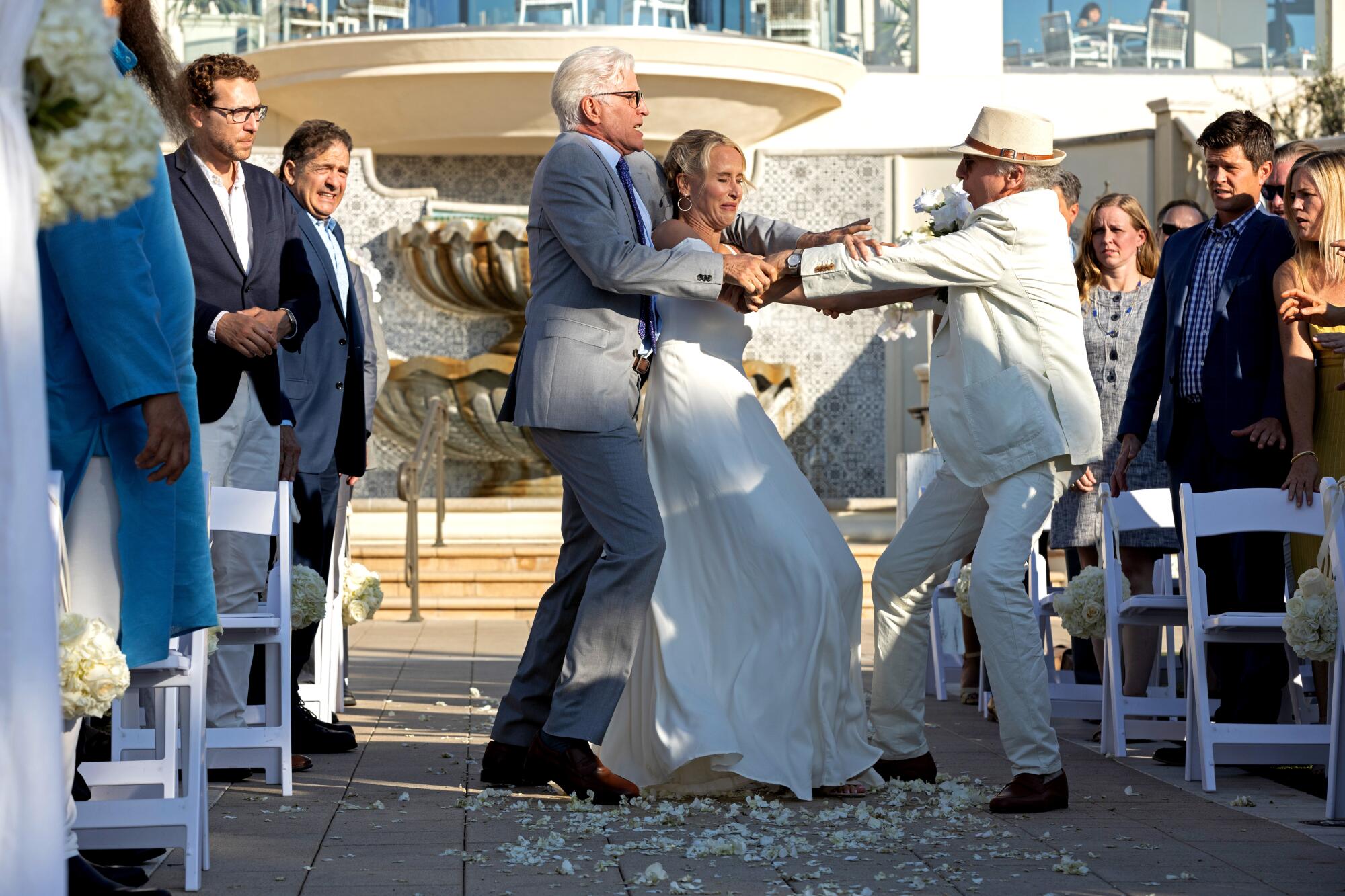
It’s also one of many episodes that winks at our culture’s obsession with celebrity: Two men who are household names because of their television successes, but with vastly different reputations, go to war over who actually is the better person.
“My reputation is being nice,” Danson concedes. “So you can play that up and scrape away the fact that, actually, it’s false in many ways and irritating to Larry. Or Larry can be obnoxious in his truth-telling … about things that don’t really need to be raised to that level of intensity.”
Plus, Danson says, “you wouldn’t allow a character on TV to be that obnoxious if you did not know that he was actually a kind, funny, sweet man at heart.”
One thing that is hard for Danson about the show? Because of “Curb,” people believed he divorced his wife and sometimes “Curb” co-star Mary Steenburgen. (On the series, he is now, appropriately enough, dating Larry’s ex-wife, Cheryl.)
“It was hard even in make-believe-land to be separated and divorced from my wife,” he says.

Danny Duberstein
“Curb’s” knack for playing on the meta was in full gear during its seventh season. It gave the fan community what it wanted — a reunion with the cast of “Seinfeld” — while also mocking our need for it with David’s unavoidable self-sabotaging.
But it wasn’t just David who poked fun at his foibles. “Seinfeld” co-star Michael Richards acknowledges his real-life racist rant at the Laugh Factory in 2006 when, in the series, he sees Leon at his dressing room door. As a favor to Larry, Leon has disguised himself as “Danny Duberstein,” a certified public accountant who was adopted into a Jewish family and survived a diagnosis of (fictitious except for the show) Groat’s disease.
Leon, clearly, has not done any reading on these topics. And when Larry is late, he’s left alone with Richards to convince him otherwise.
“Leon is now a character within a character, which is even another level to what Leon can bring to this scene,” Smoove says. “I like that, even as Leon’s supposedly being Danny Duberstein, I’m still selling something to Michael Richards.”

Palestinian Chicken

As with “Seinfeld,” “Curb” is a Jewish show simply by the fact that its lead is Jewish. And the series has never shied away from hot-button or taboo topics across cultures: In the ninth season, a fatwa is issued against Larry; in the 10th, which aired in 2020, he dons a red MAGA hat to keep people away from him; last season, he helped himself to a pair of shoes worn by a Holocaust victim when his were ruined.
In one of its most famous episodes, the Season 8 entry “Palestinian Chicken,” “Curb” took on one of the thorniest subjects of all when Larry falls in love with the delicious chicken at a restaurant run by an antisemitic family — and attempts to date one of its employees, played by Anne Bedian.
“It’s not like we’re thinking, ‘Oh, let’s hit the Jew card,’” David explains, adding that “Curb” is about putting him “any place where someone with a 12-year-old mentality should not be.” To wit, it’s in this episode that Larry’s behavior inspires Jeff to coin the term “social assassin.”

Clean up your mess
Although it’s set in the world of one-percenters on L.A.’s Westside, “Curb” is frequently an attack on elitism. In the Season 11 episode “The Watermelon,” Kaley Cuoco guest stars as Heidi, Larry’s optometrist, who cannot be bothered to clean up the Pirate’s Booty she drops on the floor. This is a sticking point not just for Larry but for his friend Freddy (Vince Vaughn), who is dating Heidi but cannot let this transgression slide.
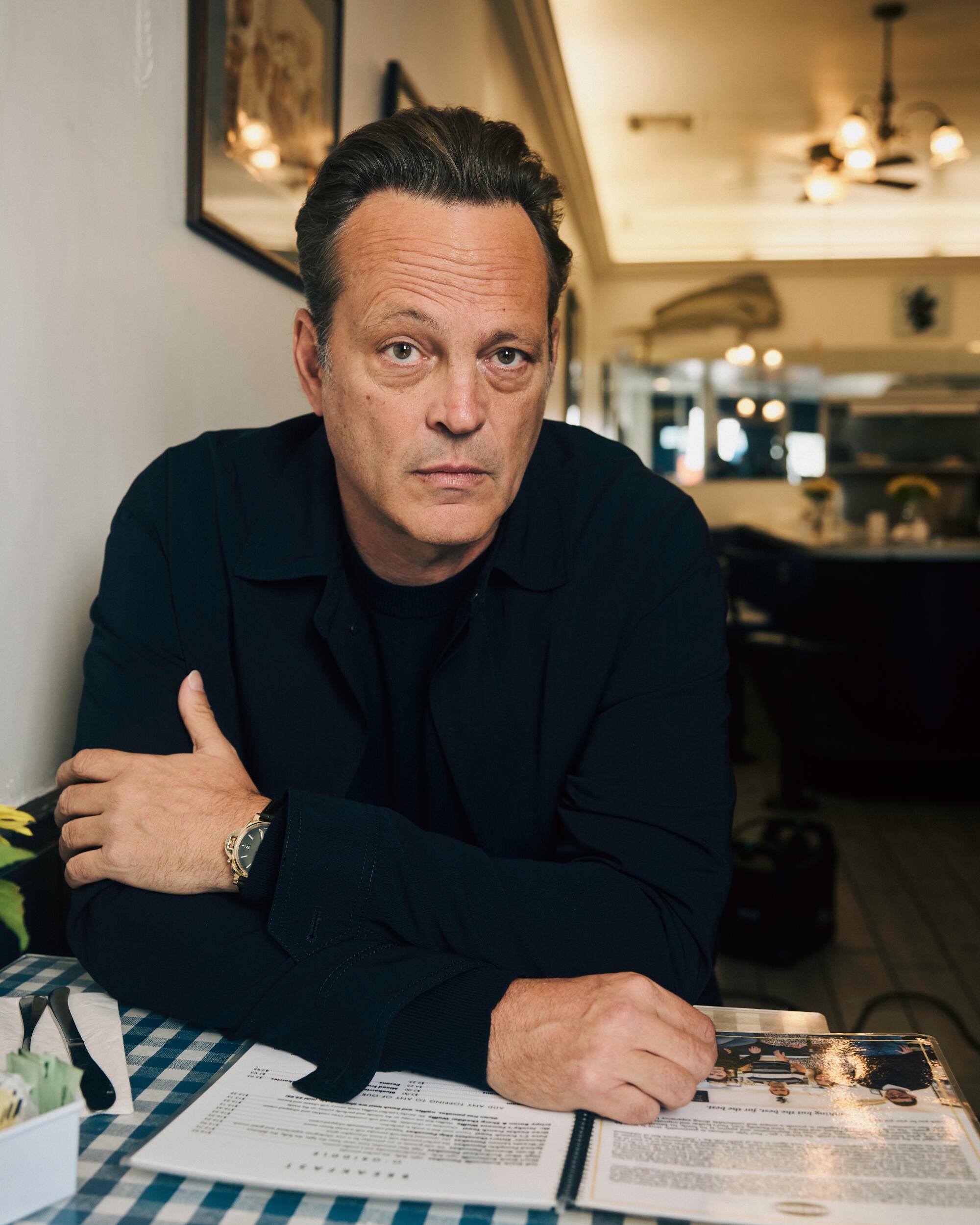
“Sometimes the more specific you are with a real area and culture, the truth is that it’s more universal,” says Vaughn, whose character is the half-brother of Marty Funkhouser, played by the late Bob Einstein. He adds that what entertains the audience is how certain people and characters react to these situations: “Whether you’re reading a book or watching a movie or a show, the more rich and specific a world is that you step into, it’s aesthetically more interesting.”
More to Read
The complete guide to home viewing
Get Screen Gab for everything about the TV shows and streaming movies everyone’s talking about.
You may occasionally receive promotional content from the Los Angeles Times.

